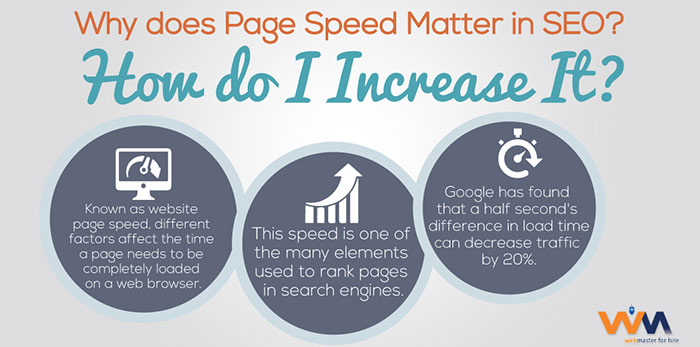1. Increase Your Site Speed for Enhanced Results
It is vital to have a fast loading website because in this competitive age, if your website takes time in loading, then the customer will not take seconds to close it and switch to another. If your website is slow, it can also be penalized with a low ranking in the SERPs. In order to increase the speed, you need to compress your files and images, continually delete unwanted website database, implement full page caching on your site, employ a CDN in order to easily distribute your content and most importantly use a credible server to host your ecommerce website.
2. Metadata Should Always be Relevant to the Page Content
It is important to fill the keywords and description of the page in the metadata of your content management system (CMS). Minimum 5 keywords that are appropriate to your business, as well as the page, are highly advisable to be added along with a comprehensive description of your page and your business. Search engines will utilize this data to ascertain how appropriate a customer’s search term is to your website/page.3. Why Your Ecommerce Site Needs a Sitemap
Adding a sitemap lists all the URLs of a website. It helps webmasters to add additional information about each URL like when was it updated last time, how often it changes, and how significant it is in relation to other URLs in the website. This enables search engines to crawl the site more intelligently. Magento possesses an XML sitemap generator and all you require to do is to reach the System > Catalog > Google Sitemap and enable the default XML Sitemap.4. Make Your Product Pages SEO-Friendly
It is a universally acknowledged fact that the central point of every ecommerce website is its products and it is very important to rightly design the pages that will be displaying those products. There are numerous websites with a poor quality of product pages and as a result, end up lagging behind in the competition. It is important to have product pages that have the right content, detailed product information in the Metadata section and a more search engine friendly URL.5. Optimize Product Images for SEO
The majority of businesses tend to pay less attention to images in their SEO campaign. However, images play an important role as ecommerce stores have countless products that customers cannot physically see or feel. If you have good images of your product along with correct file names of images to describe them, the chances of a customer getting convinced to buy the product rise incredibly. Remember to use title and alt tags on your images, as this action will assist in providing spiders the page information.Magento SEO Tips for Ecommerce Websites- An Infographic

6. Avoid Duplicate Content
Always go through the content on your website a number of times before publishing it because it is important to ascertain that there is no duplicate content on your website. You need to check the plagiarism of all the CMS pages as well as the product pages. It is also advisable to not have the identical content for different products, as this practice will provide the customers with a product description that is crafted individually.
7. Improve Search Engine Rankings with Magento SEO Extensions
You can make the most out of Magento SEO extensions in your SEO campaign for enhanced results. In order to enhance the internal linking of your site, you can use Internal SEO Linking. Easy Social Media Links is right to build a robust site presence on all leading social media websites.
In order to enhance the internal linking of your site, you can use Internal SEO Linking. Easy Social Media Links is right to build a robust site presence on all leading social media websites. Conclusion
In conclusion, implementing Magento SEO tips and best practices for ecommerce websites is vital for driving organic traffic, increasing visibility, and ultimately boosting sales. By optimizing product pages with relevant keywords, creating unique and compelling meta titles and descriptions, and optimizing site speed and mobile responsiveness, you can improve your website’s search engine rankings and user experience.
Remember, SEO is an ongoing process, and keeping up with industry trends and search engine algorithm updates is crucial for staying ahead of the competition. By consistently monitoring performance metrics and making data-driven improvements, you can ensure your ecommerce website remains competitive and achieves long-term success in the digital landscape.
Zahoor Bhat has over 10+ years of experience as an online editor and media manager. He has worked with major online news and content sites as a media manager. He is well versed with major content management systems and web platforms such as WordPress and social media networks including Facebook, Twitter, Youtube, Google Business, Yelp, Instagram & Linkedin. He is an expert in content creation, proofreading and finally making it live. Being a social media expert, he is able to make relations with social media influencers and make sure to generate leads and grow business via different social media platforms.



